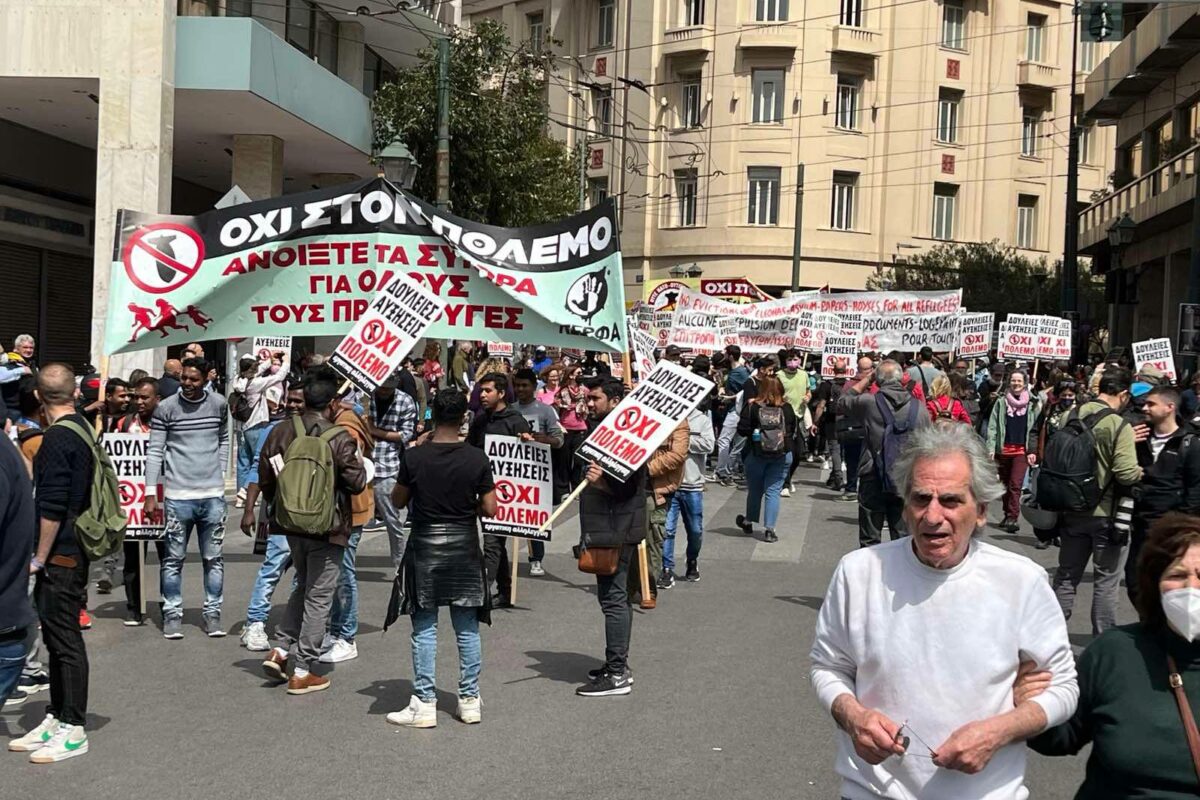On Wednesday, April 6 Greece was shut down in one of the most effective 24–hour strikes of recent years. Ten years after the repeated strikes against the second memorandum, which brought down pro-austerity governments, it looks like history is repeating itself. Although the failures of the Syriza government resulted in the hard-core neoliberal, undemocratic government of New Democracy in 2019, it appears the spirit of militant resistance has not faded away.
The strike was a great and visible success. Public transport, ports, ferry connections were shut down. Many workplaces such as catering businesses, banks and dozens of other facilities were closed. In hospitals, surgeries were postponed because of the health workers’ strike; dozens of schools and the vast majority of public services were closed.
Strike rallies were impressive in every city across the country: North to South, in big towns, islands and provincial towns. The rally in Athens was the biggest of the last few years, despite stoppages in public transport. The entire city centre was practically one huge strike manifestation, flooding streets from Omonia to Syntagma square. Hundreds of trade unions participated with their banners, sending the message that the working class remains a force that can collectively overturn the plans of government and employers. Immigrants and refugees were present to protest the horrible practices of Frontex and appalling conditions in the camps, but also to show solidarity with the trade unions.
This success did not fall from the sky. It was the culmination of “small”, separate struggles which took place recently in big sectors like health and education, but also militant industrial unions like Kavala Fertilizers and oil refineries, the metal industry of LARCO, who are fighting against closures and privatizations, the port workers of COSCO, the unionizing success of e-food courier workers, etc. It was this movement from below that forced the trade union leaderships of the Greek TUC (the GSEE, notorious for its lack of activity) and the most militant ADEDY of the public sector to call the strike on 6 April. The rank-and-file workers and the left took the chance and organized to make it a success.
We want jobs, wages increase – not bombs
The strike rallies were both anti-government and anti-war. Slogans against the war and calling for the sacking of the right-wing government of poverty and war mongering were dominant. Workers went on strike and demonstrated, putting forward their own demands for jobs and wage increases, and against poverty, closures and privatization.
In Thessaloniki, protesters who tried to express their opposition to the use of the port for the transfer of NATO military equipment were tear-gassed with chemicals and 11 of them were arrested. A protest to demand their release was called for Thursday evening.
After the success of the general strike, there is more confidence and optimism to fight back. The horrible politics of New Democracy have been addressed in many articles (in this webpage as well), however, this time it looks like the polished “success story” image of Mitsotakis is withering. And despite his control over mass media, the government is declining at the polls too.
New Democracy’s catastrophic policies
The general strike came officially as a response to the staggering inflation that has ruined the living standards of the majority of the working class. Mitsotakis‘ government have pandered to the bosses, so they feel empowered when negotiating with the trade-union bureaucracy to reject increases of more than 3% to the minimum wage, because, according to the employer’s union, this could supposedly “cause a spiral of inflation and a blow to productivity”!
In February, official inflation in Greece was 7.2%, the highest in 27 years, and forecasts suggest that in March it will reach 8%. These figures don’t give the entire picture: The poorer you are, the higher the inflation. The poorest 20% of the population spends 54% of their monthly budget on food, while for the richest 20% the percentage is just 13.4%.
At the same time ministerial officials are revising the budget’s “growth” forecasts downwards and the primary deficits upwards. That is, they admit that the nightmare of “stagflation” is here.
Against this prospect, the government continues to embrace the market lobby and pass the bill on the people’s backs. People are complaining about the profiteers of the energy “providers” and Mitsotakis claims that he will impose an audit on their “excess profits”. It’s a mockery. The government itself, with its privatization of the Electricity Company (DEH), sparked the speculation of the private “investors” on the backs of consumers, rocketing gas and electricity prices sky high.
The government and their friends have become so arrogant that they confess their plans cynically, spitting in the face of the people. A few weeks ago, a right-wing television figure said during his show that “those who earn 500 euros a month have no reason to worry about the price of fuel since they couldn’t afford to own a car anyway!” Such statements reflect exactly how the ruling class and its government feel about everyday people.
This is not the only record Greece holds. The country now has the highest proportion of deaths due to COVID-19 relative to its population. Greece surpassed all the old EU members, leaving behind Belgium and Italy. This sentiment came out during the strike, when protesters were connecting cuts on healthcare with concessions to the bosses and arms spending.
War-monger politics
While the income of the working-class majority is being decimated by high prices, Mitsotakis‘ government is buying more arms. According to the latest NATO figures, Greece comes first in military spending as a percentage of GDP. NATO has a target of two percent of each member country’s GDP, but Greece spends twice as much, reaching four percent in 2021, where in 2014 this figure was just over two percent.
The new “deed” of the ministry of Defense is the acquisition of three Belharra frigates – with the option to buy one more – and six additional Rafale fighter aircrafts – in addition to the 18 already acquired. The cost for the frigates is 3.049 billion euros (4.07 with the fourth). For the additional Rafales, the total cost is 1,049 billion euros.
The Greek state is an avid supporter of Ukraine in the ongoing war with Russia – not out of empathy for the victims of the invasion, but out of geopolitical expediency. Greece is pursuing a position in the higher echelons of NATO’s imperialist hierarchy in a competition with their neighboring rival, Turkey. Antagonism over big energy projects (such as gas lines to supply the European Union countries in the wake of the war) is the real motive behind all types of pro-Nato and right-wing ideologues, who blame it all on Putin and Russia for invading Ukraine.
Despite the latter’s efforts, in the last weeks there have been various large-scale manifestations demanding Russian withdrawal. Yet they are also opposed to NATO expansion and Greece’s military involvement in the war and arms spending.
While this report was being written, another disgusting provocation took place inside the Greek parliament while it was hosting a speech by the Ukrainian president. Zelenskyy shared his speech with a member of the fascist battalion Azov, sparking a wave of anger both in public opinion and even inside the Greek government.
This blunder is turning out to be a disaster for Mitsotakis, no matter what Zelenskyy and his thug said in their speeches (no one was interested in hearing them anyway). What really matters for the Greek people is that one year after having succeeded at putting Greek neo-Nazis in prison through a mass struggle, the government is normalizing Nazism. Such policies are not to be tolerated. Our hopes lie with these feelings of anger and militancy, as with class resistance and political advances. These can become the gravedigger of this government and serve a blow to the capitalist interests it serves.




